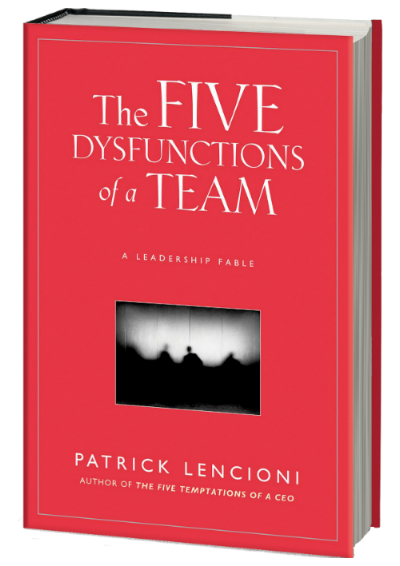
Recap
This book starts with a story about an imaginary tech company that is going through a hard time after an initial success. The board decides to bring a new CEO onboard. She starts to make changes and building a team until she manages to turn the company around.
The author defines five dysfunctions that prevent teams from achieving collective result and success. These dysfunctions are not independent of each other. Instead, they are like a pyramid in which each dysfunction creates a base for the next one.
- Absence of Trust
- Team members who are not vulnerable to the group and not genuinely open to their mistakes and weaknesses, make it impossible to build a foundation for trust.
- In context of team building, trust is the confidence among team members that their peers will not use their weaknesses against them.
- Fear of Conflict
- In the absence of trust, it becomes very hard for team members to have unfiltered and passionate debates.
- Healthy discussions and debates are about ideas and concepts as opposed to personality-focused criticisms.
- Lack of Commitment
- Without healthy debates and discussions among team members and without everyone having a chance to be heard, team members may not fully commit to decisions made.
- In the context of a team, commitment is a function of clarity and team buy-in.
- The desire for consensus and the need for certainty can lead to lack of commitment.
- Avoidance of Accountability
- Without the commitment to a clear plan, team members avoid calling their peers on the actions and behaviors that hurt the team.
- Sometimes, teams members avoid holding one another accountable because they are afraid of interpersonal conflicts or hurting personal relationships.
- The will hurt the relationships over the time as team members start to concern about the group standards and meeting the expectations.
- Inattention to Results
- In the absence of holding one another accountable for team goals, team members put their individual goals above the collective goals of the team.
- A functional team must make the collective results and performance of the team more important than individual goals and accomplishments.
Functional teams:
- They trust each other and they are open to their mistakes and weaknesses.
- They engage in passionate and healthy discussions and debates.
- They disagree and commit to decisions and plans made by the team.
- They hold each other accountable for delivering against the team plans.
- They put the collective and team results first.